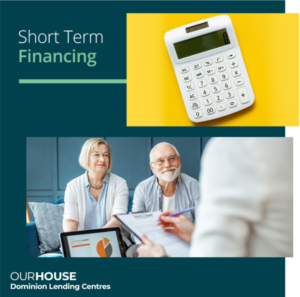Short-term financing – credit or loans that are designed to be paid off in a short period of time – can be a useful financial tool in a variety of different situations, such as:
- Bridge financing
If you’re planning on moving and have found a new home before selling your existing one, you may need a short-term loan to make a down payment on the new place.
- Seizing an investment opportunity
If an opportunity arises, a quick injection of cash will enable you to take advantage of it.
- Consolidating debt
If you have multiple different loans, you can consolidate them into one single loan if you find one with a lower interest rate.
- Covering unexpected expenses
Accessing some short-term cash will let you cover unplanned expenses, such as paying off medical bills or helping out an adult child during a period of unemployment.
But what are the different types of short-term financing options? And how do you know which are right for your situation?
Short-term financing options
Home Equity Line of Credit (HELOC)
A HELOC is a revolving line of credit secured against your home, typically allowing you to borrow up to 80% of your home’s value.
Pros:
- Interest rates are typically low.
- You have flexibility over when you pay it off.
- You can access portions of the approved sum at different times.
- You therefore only pay off and pay interest on the amount you access.
Cons:
- Retirees can find it hard to qualify, particularly if they don’t have a regular income or a strong credit score.
Private Loan or Mortgage
These are loans which typically have a period of one year.
Pros:
- They’re usually fairly easy to qualify for if your home has enough equity.
Cons:
- Set-up fees and interest rates are typically high.
Short-Term Installment Loan
These are loans in which set amounts are repaid at regular intervals for the term of the loan.
Pros:
- You pay it off in installments rather than all at once.
Cons:
- Unlike a credit card or line of credit, you can’t access portions of the approved sum at different times.
- They can include hidden prepayment fees.
Payday Loan
A payday loan is a short-term loan characterized by very high interest.
Pros:
- Usually easy to qualify for.
- You can often access them even if you have a bad credit score.
Cons:
- Interest rates are extremely high – often exceeding 300% over a year.
Convertible Mortgage
These are short-term mortgages, typically six months, with a fixed interest rate.
Pros:
- They can be switched to a long-term mortgage if you choose.
Cons:
- They usually have a higher interest rate than adjustable rate loans.
Cross Collateralization
This is when the collateral of one loan, such as a car, is used to secure another loan you have with the same lender.
Pros:
- Interest rates can be lower.
Cons:
- The lender may keep you from selling the asset being used as collateral, even if you have paid it off.
A New Short-Term Financing Option
CHIP Open is a new, short-term financing product offered by HomeEquity Bank. It’s a reverse mortgage which allows you to access up to 55% of the value of your home in tax-free cash. However, unlike a traditional reverse mortgage, there are no prepayment fees, meaning you can pay off the full amount whenever you like.
Pros:
- Easier to qualify for than other short-term products since its not based on income or credit rating.
- No monthly repayments.
- Interest rate and fees are highly competitive in the short-term lending space.
- If you decide you need a longer-term solution, you can switch to the CHIP Reverse Mortgage at a lower interest rate.
Cons:
- Only available for Canadians 55+.
- You must own your home.
- Interest rates are higher than the regular CHIP Reverse Mortgage, allowing us to completely waive any prepayment penalties.
If you’d like to find out more about how CHIP Open can help you with your short-term financing needs, contact me today!
